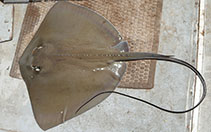| Family: |
Dasyatidae (Stingrays), subfamily: Dasyatinae |
| Max. size: |
104 cm WD (male/unsexed) |
| Environment: |
demersal; brackish; marine |
| Distribution: |
Atlantic Ocean (Ref. 81259, 7397). |
| Diagnosis: |
Description: A large stingray; disc rhombic, its anterior margins forming an obtuse angle (Ref. 81259). Dorsal surface partially rough, with scattered dermal denticles, more concentrated on head and trunk; an irregular mid-dorsal row of backward-pointing thorny tubercles with oval bases embedded in the skin, as well as two parallel scapular segments of small, irregular tubercles (Ref. 81259). Tail whip-like and spinous behind the sting, with a dorsal ridge and a well developed ventral fold as high as tail depth (Ref. 81259).
Colouration: Back greenish-grey-brown; belly white, pectoral margins slightly darkened; tail brownish behind the sting, ventral tail fold blackish (Ref. 81259). |
| Biology: |
A coastal species, occasionally entering lagoons, shallow bays and estuaries (Ref. 81259). Ovoviviparous (Ref. 50449). |
| IUCN Red List Status: |
Not Evaluated (N.E.) Ref. (130435)
|
| Threat to humans: |
harmless |
Source and more info: www.fishbase.org. For personal, classroom, and other internal use only. Not for publication.
